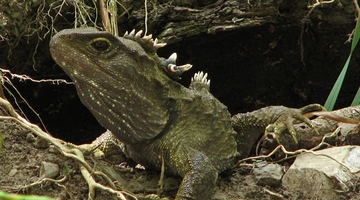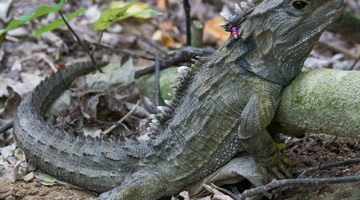Mainland sanctuaries, also known as mainland islands1, are an important conservation2 strategy in New Zealand. In this video clip, Associate Professor Alison Cree, from the University of Otago, talks about the establishment of Orokonui Ecosanctuary and the process of introducing tuatara to the sanctuary.
Point of interest
Why do you think the 2 visitors are searching their bags before they enter the sanctuary?
Jargon alert
Translocation3: when a number of individuals are transported to a new area to establish a new population4 or to help restore an existing population.
Transcript
DR ALISON CREE
Mainland sanctuaries are important to help restore the former distributions of animals that have lost a lot of their natural living space because of the activities of humans. So by making sanctuaries that have fences around them to keep out predatory mammals can give our endemic5 animals that are found nowhere else the chance to have some safe habitat6 where they once used to occur.
The creation of the Orokonui Sanctuary goes back a number of years now to some people who had the vision of creating or restoring the kind of habitat we would have had in Otago and the kind of organisms – the animals and the plants that would have lived there – as a resource for the people of Otago. They held some public meetings and I went along. So a group of us who had interests in the biology7 of animals got together and worked out a plan for what kind of organisms would be appropriate to have in the sanctuary and whether it was feasible8 to bring them back, and I’ve been particularly involved with giving advice on the tuatara.
I’ve had the opportunity to have a student, Anne Besson, who has researched the suitability of the area for tuatara especially in terms of temperature9, and with the information we have now got, we think it’s feasible to consider putting tuatara there. And so I’ve helped write a translocation proposal with Sanctuary staff, and there are a lot of questions that are asked about why is this a good idea and are you sure you can do it? And that goes to the Department of Conservation and to the iwi10 of the area where the animals might be sourced and the iwi here locally to get their feedback on it as well.
So that process of consultation is happening at the moment. So we don’t have a definite outcome in sight, but we hope in the future it might be possible to see tuatara here in a few years time.
Acknowledgements:
Peter Morrison, Department of Conservation. Crown copyright 2009.
Rod Morris, Department of Conservation. Crown copyright 2009.




